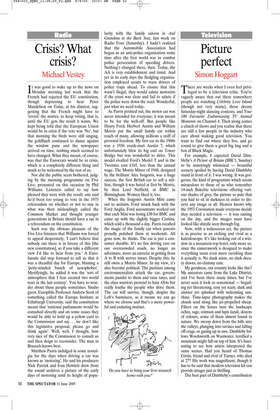Crisis? What crisis?
Michael Vestey
It was good to wake up to the news on Monday morning last week that the French had rejected the EU constitution, though depressing to hear Peter Mandelson on Today, at his slimiest, suggesting that the French might have to ‘revisit’ the matter, to keep voting, that is, until the EU gets the result it wants. We kept being told that the European Union would be in crisis if the vote was ‘No’, but that morning the birds were still singing, the goldfinch continued to dance against the window pane and the newspaper arrived on time; nothing much seemed to have changed. What they meant, of course, was that the Eurocrats would be in crisis, which is a completely different thing and much to be welcomed by the rest of us.
Nor did the public seem bothered, judging by the morning programme on Five Live, presented on this occasion by Phil Williams. Listeners called to say how pleased they were with the result; one said he’d been too young to vote in the 1975 referendum on whether or not to stay in what was then misleadingly called the Common Market and thought younger generations in Britain should have a say in a referendum on the constitution.
Such was the obvious pleasure of the Five Live listeners that Williams was forced to appeal desperately, ‘I can’t believe that nobody out there is in favour of this [the new constitution], so if you take a different view I’d like to hear from you.’ A Eurofanatic did step forward to tell us that it was a dreadful day for Europe, blaming a ‘petty-minded bunch of xenophobes’. Mystifyingly, he added it was the ‘sort of atmosphere that I fear created two world wars in the last century’. You have to wonder about these people sometimes. Studio guest, Europhile Professor Andrew Scott of something called the Europa Institute at Edinburgh University, said the constitution meant that ‘national parliaments would be consulted directly and on some issues they would be able to hold up a yellow card to the Commission and say ... we don’t like this legislative proposal, please go and think again’. Well, well, I thought, how very nice of the Commission to consult us and then deign to reconsider. The man in Brussels knows best.
Matthew Parris indulged in some nostalgia for the days when driving a car was known as ‘motoring’. He and his producers Nick Patrick and Ivan Howlett drew from the sound archives a picture of the early days of motoring until its height of popu larity with the family saloon in And Grandma in the Back Seat, last week on Radio Four (Saturday). I hadn’t realised that the Automobile Association had begun as an anti-police organisation some time after the first world war to combat police persecution of speeding drivers. Nothing’s changed there, then. Today, the AA is very establishment and timid. And yet in its early days the fledgling organisation employed scouts to warn drivers of police traps ahead. To ensure that this wasn’t illegal, they would salute motorists if the coast was clear and fail to salute if the police were down the road. Wonderful, just what we need today.
As Parris pointed out, the motor car was never intended for everyone; it was meant to be for the well-off. But people like Henry Ford, Herbert Austin and William Morris put the small family car within reach of many, allowing millions a sniff of personal freedom. My first car in the 1960s was a 1936 crank-start Austin 7, which unfortunately blew its big end on Tower Bridge but was wonderful to drive. This model rivalled Ford’s Model T and in the Twenties cost £165, less than the annual wage. The Morris Minor of 1948, designed by the brilliant Alec Issigonis, was a huge success, the first British car to sell a million, though it was hated at first by Morris, by then Lord Nuffield, at BMC in Birmingham. Women liked it, too.
When the Issigonis Austin Mini came out to acclaim, Ford struck back with the Ford Anglia. Ford accountants worked out that each Mini was losing £30 for BMC and came up with the slightly bigger Cortina, which sold a thousand a day. Parris recalled the magic of the family car when parents proudly polished them at weekends. All gone now, he thinks. The car is just a consumer durable. It’s no fun driving cars on our overcrowded roads, no longer an adventure, more an exercise in getting from A to B with nerves intact. Despite this, he still owns a Morris Minor. In my view, it’s also become political. The puritans among environmentalists attack the car, governments pander to them and raise taxes, and the class warriors pretend to hate 4X4s but really loathe the people who drive them. The car will survive, though, despite the Left’s barminess, as it means we can go where we choose and that’s a more powerful and enduring instinct.


















































 Previous page
Previous page